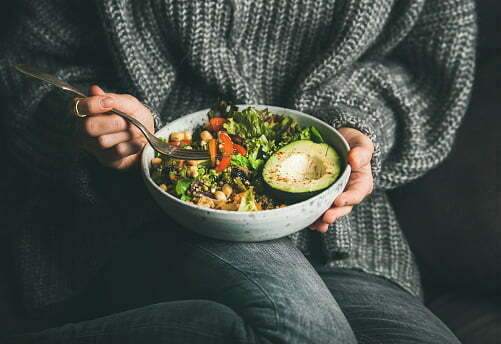High calorie foods can be helpful for those looking to gain weight or build muscle mass. However, it’s important to choose calorie-dense foods that are also nutrient-dense and provide essential vitamins and minerals. Examples of high calorie foods include nuts and nut butters, avocados, dried fruit, whole grain bread, cheese, full-fat yogurt, and fatty fish such as salmon.
It’s important to focus on healthy sources of calories rather than simply consuming high-calorie junk foods. It’s also important to pay attention to portion sizes and to ensure that you are still getting a balance of macronutrients such as protein, carbohydrates, and healthy fats. A healthcare professional or registered dietitian can help you to develop a personalized meal plan that includes high calorie foods in a healthy and sustainable way.
What Are The High Calorie Food For Weight Gain?
Gaining weight requires a calorie surplus, which means consuming more calories than you burn. Eating high-calorie foods can help individuals to increase their calorie intake and support weight gain goals. However, it’s important to choose nutrient-dense foods that provide essential vitamins and minerals rather than simply consuming high-calorie junk foods. Some examples of high calorie foods for weight gain include:
- Nuts and Nut Butters: Nuts and nut butters are high in healthy fats and protein, making them a great snack for weight gain. Almonds, cashews, and peanut butter are all good options.
- Avocado: Avocado is a high-calorie fruit that is also rich in healthy fats and fiber. It can be added to smoothies, salads, or eaten on its own.
- Dried Fruit: Dried fruit is a concentrated source of calories and can be added to trail mix, oatmeal, or yogurt.
- Full-Fat Dairy Products: Full-fat dairy products such as cheese, yogurt, and whole milk are high in calories and protein, making them a great addition to meals and snacks.
- Fatty Fish: Fatty fish such as salmon or mackerel are high in healthy fats and protein, making them a great addition to meals.
- Whole Grains: Whole grains such as brown rice, quinoa, and whole grain bread are high in complex carbohydrates and fiber, providing sustained energy and calories.
- Lean Proteins: Lean proteins such as chicken, beef, and tofu are high in protein and can help to support muscle growth and repair.
It’s important to consult with a healthcare professional or registered dietitian to develop a personalized meal plan that includes high-calorie foods in a healthy and sustainable way. Regular strength training and physical activity can also support healthy weight gain by building muscle mass.
Weight Gain Foods
Weight gain foods are those that are high in calories and can help individuals to increase their calorie intake and gain weight. Some examples of weight gain foods include nuts and nut butters, dried fruit, full-fat dairy products, eggs and milk, fatty fish, whole grains, banana, and lean proteins such as chicken, beef, and tofu. It’s important to choose nutrient-dense foods rather than high-calorie junk foods, and to focus on healthy sources of calories that provide essential vitamins and minerals. Additionally, it’s important to consume enough protein to support muscle growth and repair.
A healthcare professional or registered dietitian can help individuals to develop a personalized meal plan that includes weight gain foods in a healthy and sustainable way. Regular strength training and physical activity can also support healthy weight gain by building muscle mass.

Weight Gain Shakes
Weight gain shakes can be a convenient and effective way to increase calorie intake and support weight gain goals. These shakes typically contain a blend of protein powder, carbohydrates, healthy fats, and other nutrients. Some weight gain shakes may also include additional supplements such as creatine or beta-alanine to support muscle growth and strength. It’s important to choose a high-quality protein powder that is free from additives and fillers, and to choose healthy sources of carbohydrates such as oats, fruit, or sweet potatoes.
It’s also important to pay attention to portion sizes and to ensure that the weight gain shake is not replacing whole, nutrient-dense meals. Additionally, it’s important to consult with a healthcare professional or registered dietitian before starting any weight gain supplement to ensure that it is safe and appropriate for individual needs and goals.
Can We Use Mass Gainer For Weight Gain?
Mass gainers are supplements that are designed to help individuals gain weight and build muscle mass. They typically contain a blend of carbohydrates, protein, and healthy fats, along with additional vitamins and minerals to support overall health. While mass gainers can be a convenient and effective way to increase calorie intake and support weight gain goals, it’s important to use them in conjunction with a healthy diet and exercise routine.
Mass gainers can be especially useful for individuals who have a hard time consuming enough calories through whole foods alone. They can also be helpful for athletes or individuals with high calorie needs who are looking to support muscle growth and recovery.
However, it’s important to choose a high-quality mass gainer that is free from additives and fillers, and to follow the recommended serving size. Consuming too much can lead to excessive calorie intake, which can contribute to weight gain in the form of fat rather than muscle.
It’s also important to consult with a healthcare professional or registered dietitian before starting any weight gain supplement to ensure that it is safe and appropriate for individual needs and goals. Additionally, regular strength training and physical activity can also support healthy weight gain by building muscle mass.
What To Do For Rapid Wight Gain?
Rapid weight gain can be achieved by increasing calorie intake and engaging in activities that promote muscle growth. However, it’s important to approach weight gain in a healthy and sustainable way to avoid negative health consequences.
Here are some tips to promote rapid weight gain:
- Increase Calorie Intake: Consuming more calories than you burn is essential for weight gain. Eating calorie-dense foods such as nuts, dried fruits, full-fat dairy products, and lean proteins can help to increase calorie intake.
- Eat Frequently: Eating frequent meals throughout the day can help to increase calorie intake and promote muscle growth. Aim to eat every 2-3 hours to maintain a consistent calorie surplus.
- Strength Training: Engaging in strength training exercises such as weightlifting or resistance band workouts can help to promote muscle growth and increase weight.
- Compound Exercises: Compound exercises such as squats, deadlifts, and bench press are effective at engaging multiple muscle groups and promoting rapid muscle growth.
- Protein Intake: Consuming enough protein is essential for muscle growth. Aim to consume at least 1 gram of protein per pound of body weight per day.
- Rest and Recovery: Rest and recovery are essential for muscle growth. Aim to get at least 7-8 hours of sleep per night and allow for rest days between workouts.
It’s important to consult with a healthcare professional or registered dietitian before starting any weight gain program to ensure that it is safe and appropriate for individual needs and goals. Additionally, it’s important to approach weight gain in a healthy and sustainable way to avoid negative health consequences.
Weight Gain Meal Plan
A weight gain meal plan is designed to provide a calorie surplus to promote weight gain and muscle growth. The plan typically involves consuming calorie-dense foods that are rich in nutrients such as proteins, carbohydrates, and healthy fats.
In addition, it’s important to consume frequent meals throughout the day to maintain a consistent calorie surplus. A typical weight gain meal plan may include breakfast options such as whole eggs, cooked oats, avocado, and berries, as well as snacks such as apples with almond or peanut butter.
For lunch and dinner, meals can include grilled chicken or tofu, roasted sweet potatoes and asparagus, quinoa, and mixed greens salads. It’s important to adjust portion sizes and overall calorie intake based on individual needs and goals, and to choose whole, nutrient-dense foods to support overall health. Consulting with a healthcare professional or registered dietitian can also help to ensure that the meal plan is safe and appropriate for individual needs and goals.
Conclusion
In conclusion, high calorie foods are essential for individuals looking to gain weight and increase muscle mass. Consuming calorie-dense foods such as nuts, seeds, dried fruits, full-fat dairy products, and lean proteins can help to increase calorie intake and promote weight gain. However, it’s important to approach weight gain in a healthy and sustainable way by choosing whole, nutrient-dense foods and avoiding processed and unhealthy foods.
Additionally, it’s important to engage in regular exercise and strength training to promote muscle growth and avoid negative health consequences. Consulting with a healthcare professional or registered dietitian can also help to ensure that the diet is safe and appropriate for individual needs and goals. By incorporating high calorie foods into a balanced and healthy diet, individuals can achieve their weight gain goals and promote overall health and wellness.
Related Posts
This article is reviewed by Russel, before publishing. If you have any doubt, you can contact us or consult with your nearby doctor. Remember, in medical matters, there is no same advice, cure, and medicine for all.

